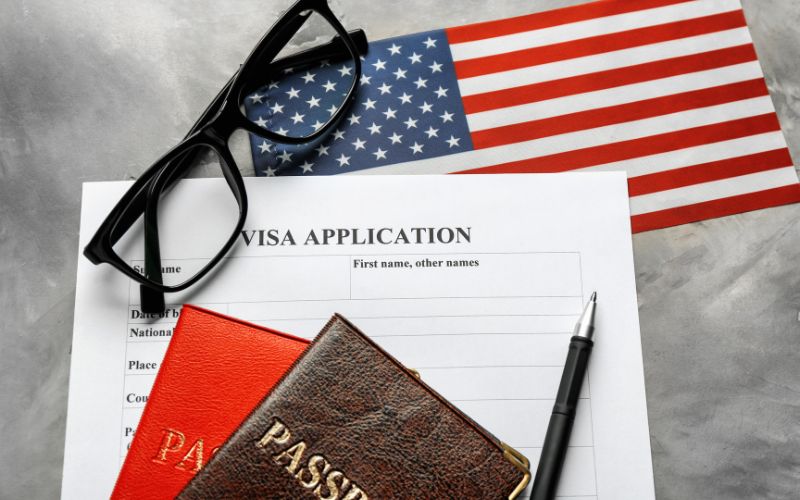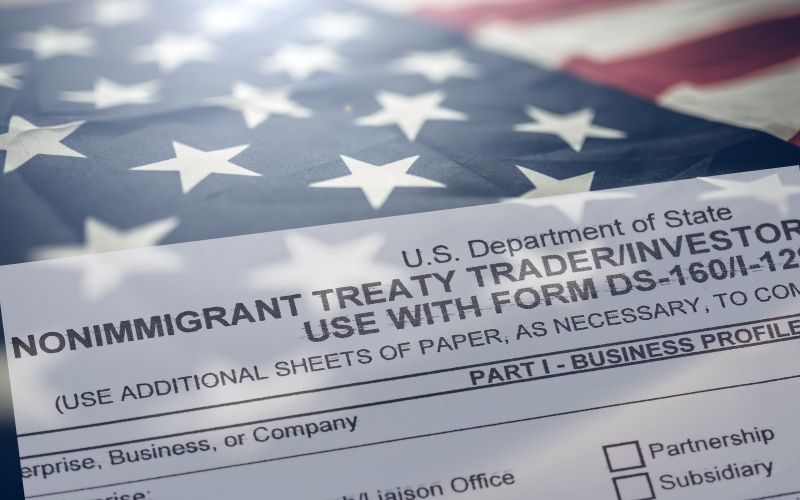For aspiring investors eyeing the U.S. market, the E2 nonimmigrant visa often comes across as both a golden opportunity and a bureaucratic mystery.
To qualify for the E-2 visa, the individual’s home country must have a trade agreement with the United States.
One of the most frequently asked questions is: Is the E-2 visa an immigrant or non-immigrant visa? It’s a question that heavily influences your business, residency, and family plans in the U.S.
Understanding the classification of the E-2 visa is more than a matter of legal trivia. It can impact your ability to apply for permanent residence, influence your strategy for renewing your status, and affect the business model you build.
In this guide, we’ll unpack the E-2 visa’s non-immigrant status, what it means for your future capacity to remain in the U.S., and how it fits into a broader immigration strategy. Buckle up—we’re diving into treaty investor territory.
What Is the E-2 Visa?
The E-2 visa is a nonimmigrant visa tailored for individuals from countries that have a trade agreement with the United States. This E2 nonimmigrant visa allows treaty investors to live and work in the U.S.
The E-2 visa is part of the broader category of nonimmigrant visas and is intended for temporary stays in the U.S.
To qualify for this visa, applicants must invest a substantial amount in a legitimate enterprise. This investment can be in the form of a new startup or an existing business with growth potential.
Basic Eligibility
To qualify as an E-2 visa applicant, you’ll need to check a few critical boxes:
- Be a national of a treaty country, holding the same nationality as the investing entity.
- Make a substantial investment—not just pocket change—in a legitimate investment enterprise, whether you start one from scratch or buy an existing business.
- Own at least 50% or demonstrate operational control over the enterprise.
- Ensure the business has the present or future capacity to generate more than enough income, not just to cover your expenses, but to make a meaningful economic contribution.
- Non-investor employees must possess specialized skills crucial for the efficient operation of the U.S. enterprise.
- Intend to depart the U.S. once your E-2 non-immigrant status ends. It is key because the E-2 is a valid visa for temporary stay, not permanent residency.
The application process can be initiated through a “change of status” while in the U.S. or by applying at a consulate abroad. In both cases, having airtight documentation and demonstrating your business’s viability will go a long way.
In short, the E-2 visa is a serious commitment— a powerful launchpad for entrepreneurs ready to bring value to the American economy.
Key Benefits
- The E-2 visa is initially granted for up to two years, but the good news is—it can be renewed indefinitely, as long as your business stays active and consistently meets the program’s requirements. It’s like a business lease with flexible extensions.
- Dependent spouses automatically receive work authorization to work anywhere in the U.S. without additional documentation. This can be a game-changer for dual-income families or career-oriented partners.
- Unmarried children under 21 can attend school in the U.S., which means access to quality education without needing a separate student visa.
- Your investment can go into a brand-new business or you can choose to buy an existing one—offering flexibility depending on your entrepreneurial style and risk tolerance.
This setup creates a unique window of opportunity for the investor and the whole family to thrive professionally and personally while living in the United States. The visa application process includes specific procedural nuances and potential costs.
Non-Immigrant vs. Immigrant Visas: What's the Difference?

Non-immigrant visas are for temporary stays in the U.S., while immigrant visas are for those who intend to live permanently. The United States maintains treaties with specific countries, which is crucial for the eligibility of non-immigrant visas like the E-2.
Understanding the difference between these two types of visas is essential for anyone considering a move to the United States.
Immigrant = Green Card Pathway
Immigrant visas are for individuals who plan to make the U.S. their forever home. These are the visas that open the door to permanent residence, also known as a Green Card. They come in several flavors:
Family-based visas:
Sponsored by a U.S. citizen or a lawful permanent resident relative.
Employment-based visas:
This option is available to those with job offers in the U.S. or individuals recognized for extraordinary ability.
Refugee/asylum pathways:
For individuals seeking protection.
The common thread? Immigrant visas allow dual intent—meaning you can enter the U.S. on the path to stay permanently without needing to pretend you’ll leave. You’re planting roots.
Non-Immigrant = Temporary Intent
Non-immigrant visas like the E-2 are designed for people with a temporary purpose—business, travel, study, or work. The E-2 visa is specifically available to individuals from certain countries that have established treaties with the United States. You’re expected to leave the U.S. once that purpose is fulfilled.
U.S. Customs and Border Protection (CBP) officials play a crucial role in assessing and determining the admission of foreign citizens into the United States, ensuring compliance with entry requirements and restrictions enforced by border protection authorities.
The E-2 is unique because:
- It allows indefinite renewals as long as your business remains active and meets eligibility.
- You can live, work, and run a business for many years.
- Your spouse can work, and your children can go to school.
However, here’s the human reality:
- You’re still a guest. No matter how long you stay or how successful your business becomes, you’re not on a direct path to a Green Card.
- You must maintain “non-immigrant intent”—that is, you should be ready to leave the U.S. if your visa is not renewed.
The E-2 visa lives in a legal gray zone: generous in its day-to-day benefits, but limited in long-term security. It offers freedom—but not permanence. Think of it like renting a beautiful home with no option to buy. You’re welcome to stay and keep renewing the lease, and the landlord can say no.
Understanding this duality is critical if you’re serious about building a life—not just a business—in the U.S.
Why the E-2 Visa Is Considered Non-Immigrant

Several factors make the E-2 a non-immigrant visa:
- You must intend to depart the U.S. once your treaty investor status expires—no exceptions.
- You must maintain lawful non-immigrant status to apply for a change to E-2 status through Form I-129.
- Your business must demonstrate current or future capacity to support more than just your basic living expenses—it can’t be a side hustle.
- You’re not eligible for dual intent, unlike H-1B or L-1 visa holders, meaning you can’t plan to stay permanently while holding E-2 status.
- Your visa remains valid only while your bona fide enterprise is running and meets immigration standards.
In addition, E-2 visa holders must prove that their capital is irrevocably committed and at risk, and that the business carries the potential for job creation, scalable growth, or a positive economic impact in the U.S. economy. The goal? Show you’re more than just a visitor—you’re a value-added contributor to American business.
The Department of Homeland Security (DHS) plays a crucial role in managing visa applications, biometrics fees, and the entry of foreign citizens into the United States.
Can You Transition from E-2 to Immigrant Status?
Absolutely. While the E-2 itself doesn’t convert into a green card, there are strategic moves you can make to transition. One key aspect is that the business must demonstrate a significant economic impact on the community.
Additionally, the principal investor’s status is crucial for the visa application process.
EB-5 Visa
This path is ideal for high-net-worth individuals ready to put their money where their future is. By investing at least $800,000 in a qualifying U.S. business that creates at least 10 full-time jobs, you can apply for a green card.
It’s a bold move, but one that trades capital for a clear route to permanent residency. The funds invested must meet USCIS guidelines, and this option often works well for former principal applicants under the E-2 who want a longer-term foothold.
Marriage to a U.S. Citizen
Love conquers borders. If you marry a U.S. citizen, you can apply for a marriage-based green card, which is the most direct and reliable route to immigrant status. It’s important to show the relationship is genuine and well-documented.
Employer Sponsorship (EB-2/EB-3)
A U.S. employer may sponsor you for permanent residency under the EB-2 or EB-3 category if you work in a specialty occupation or hold an advanced degree. This process typically requires a PERM labor certification and proof that no qualified U.S. worker is available.
EB-1 Visa
This visa is reserved for individuals who can show they are among the best in their field—think Nobel Prize winners, accomplished researchers, or executives at multinational corporations.
If you can demonstrate extraordinary ability, this is a powerful, direct path to a green card without needing a job offer in some cases.
Just keep in mind: transitioning from a nonimmigrant status like E-2 to an immigrant visa requires planning, legal finesse, and a strong case. Consult an immigration attorney early in your journey.
Conclusion: Know Your Status, Own Your Strategy
The E-2 is a non-immigrant visa designed to bring ambitious treaty nationals into the U.S. to build businesses and stimulate economic growth. It provides flexibility, work opportunities for dependent spouses, and educational access for unmarried children. However, individuals must maintain their E status and intend to depart the United States upon its expiration.
The Foreign Affairs Manual plays a crucial role in guiding consular officers regarding documentation requirements and applicant qualifications for E-1 and E-2 visas.
But make no mistake—you’re operating on borrowed time. Without the ability to file for permanent residence directly, E-2 investors need to proactively plan their next move.
So what’s your play?
Consult an immigration expert to build your roadmap from E-2 to Green Card. Understand your visa validity, your options for consular processing or change of status, and whether you need additional documentation or premium processing, which can be requested for an additional fee. You’ve made the substantial trade; now invest in the right strategy.
It is crucial to understand the requirements and costs associated with visa applications, including eligibility criteria and specific documentation needed.
Welcome to the game of global entrepreneurship, where your next move matters most.
